We don’t know the future, but we can look closely at what’s happening in the present and make informed guesses about where things will go from there. That’s what Paul Graham, technologist and founder of Y Combinator recommends when it comes to the future of podcasting.
...we can also indulge our imaginations with wild speculation (skip to the end if you’re interested in that!). I recommend you finish your data before you have any pudding, though.
Data's Not Boring 💤 It Tells an Interesting Story
How many people listen to podcasts?
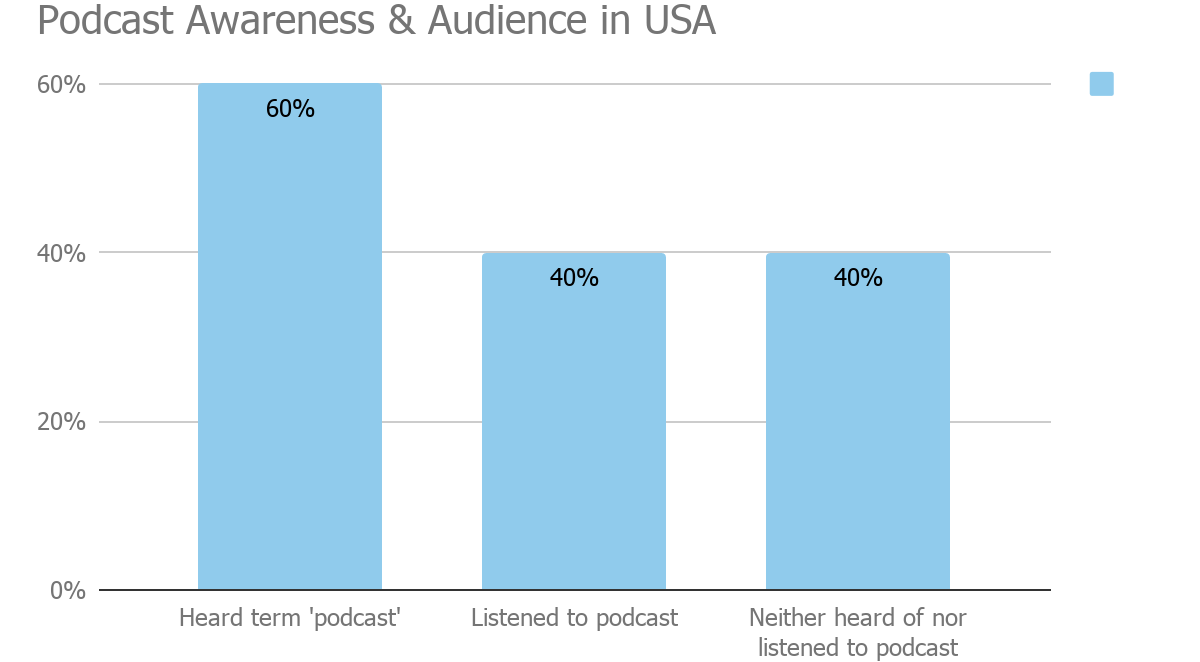
Of the people that listen to podcasts, how much do they listen to them?
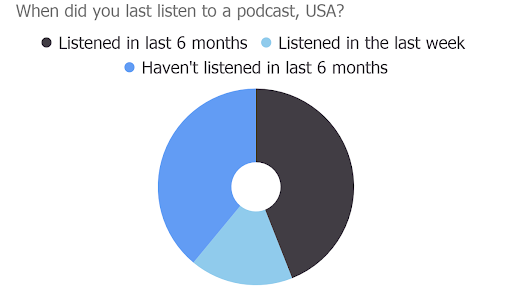
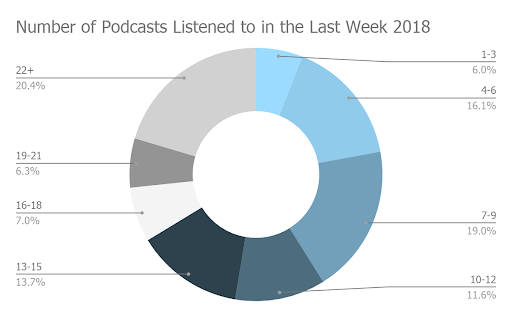
*Of the people that listened to a podcast in the last week, about half had listened to more than 10. That’s a lot of content and it suggests podcasts can be bingeable!
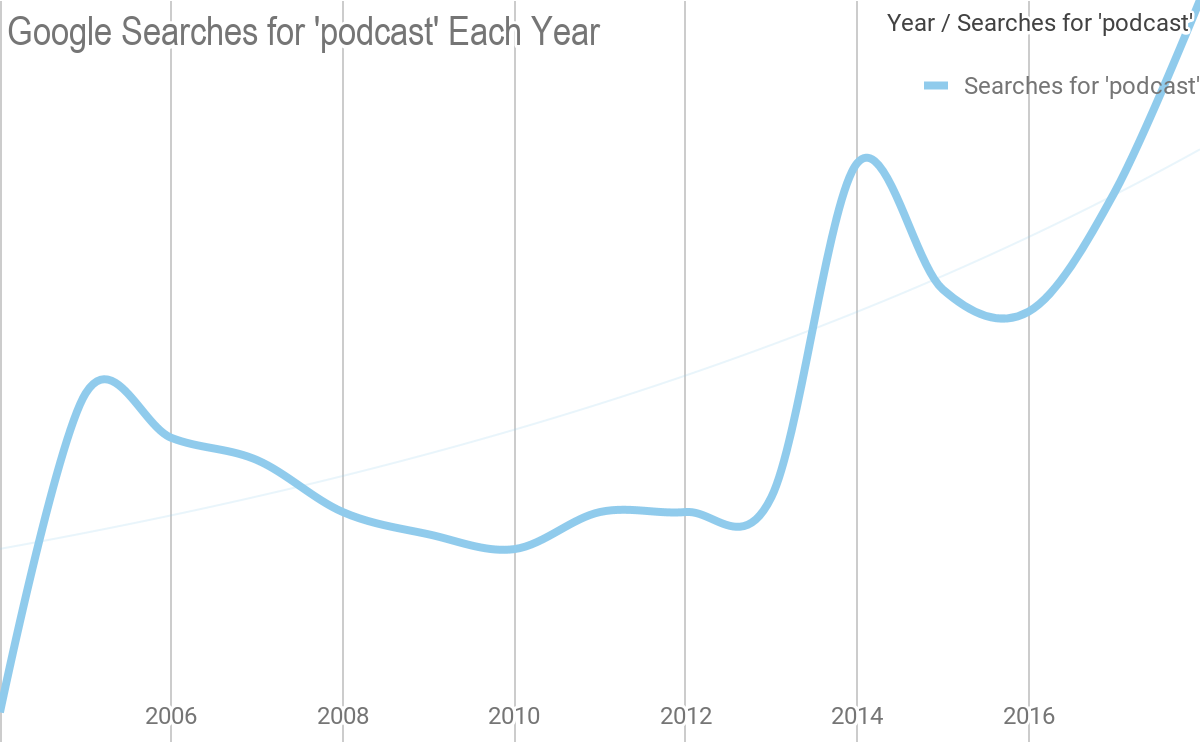
Ok, so that’s where we are now. All of this growth and yet podcasts in 2018 are still:
- Lacking in really good platforms for distribution (and therefore quite hard to find)
- Completely unheard of by 40% of America, let alone the rest of the world.
It seems reasonable to predict growth over the next five years.
What the Present Tells Us about the Future of Podcasting
Why will artificial intelligence inevitably impact the future of podcasting?
Finding relevant content will be EASY
There is currently no easy way of finding the highest quality, most relevant podcasts to you. This will change as search algorithms improve and begin to use data in more sophisticated ways to predict the kind of content you’d enjoy. When this challenge is overcome, people in your niche will be able to quickly find your content, rather than wade through an ocean of irrelevant content and hope to find you.
Podcasts will be available in all languages (so they're accessible for non-English speakers)
Google is working on using AI to convert audio content into text, translate that text into any language and then generate a voice that is a close copy of the original speaker (scary, right?). When this happens, podcasts will be more accessible to non-english speakers and the demographics of listeners will broaden.
Voice-commands could make podcasts more interactive and conversational
Voice command AI is developing independently of podcasting, with Google, Amazon and Apple racing to bring the technology forwards. Surely if you throw enough money and brains at a challenge like this, progress will be rapid? Improved voice control will make searching for podcasts easier as well as potentially interacting more with them. Amazon’s Echo, for instance, allows you to make purchases using voice command while you are listening to podcasts. (more on this later)
Google is working on ‘scrubbing’
You know how on YouTube you can hover over the timeline section under the video and it shows you images that help you to figure out what’s coming up next? Well, Google wants you to be able to do that with podcasts, showing you in text what will be discussed next.
Podcast Advertising Budgets Are Growing 💰
More money = bigger budgets and higher production quality at the top end. Larger media outlets will move into this space and create content that appeals to the masses.
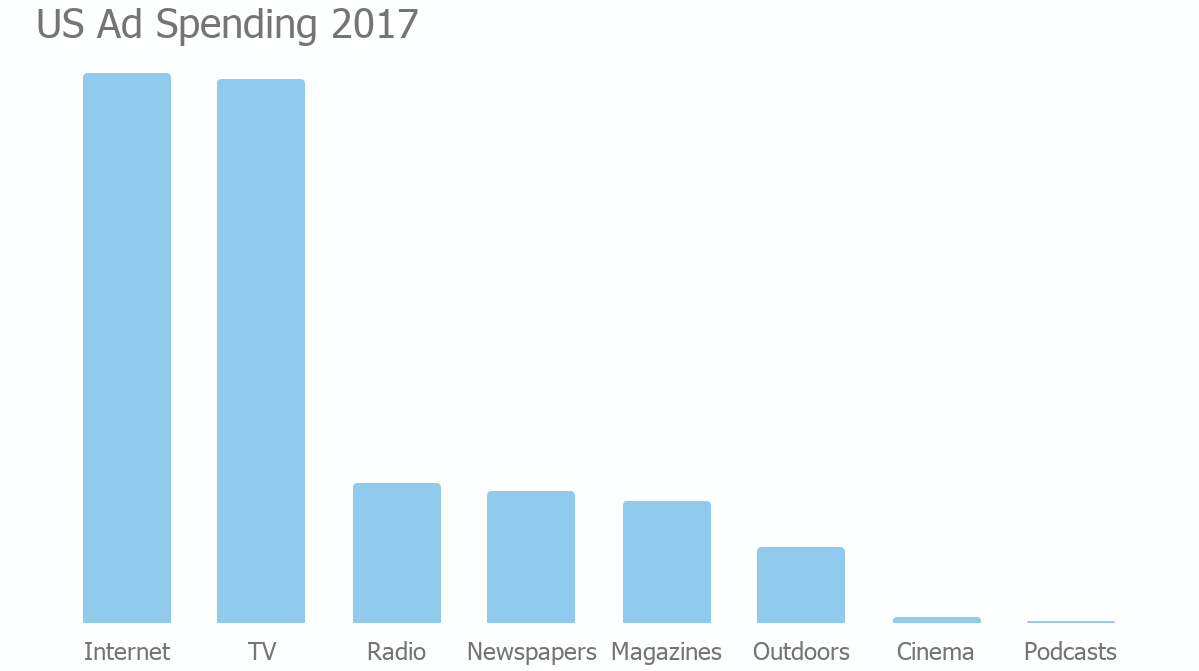
The ad cost per thousand listeners (CPM) is very high compared to other forms of media. This is because podcast listeners are 51% richer than the general population and over 40% have bought something after hearing a podcast ad. They are also a demographic that’s very hard to reach with normal ads. As more genres of podcast come out and podcast awareness increases in the general public, the new demographic won’t have such deep pockets. Podcasts that go mainstream will probably have lower CPM’s but for those mainstream shows, the number of listeners will be far higher anyway.
Currently, there's no easy way for business to play the same ad over a large pool of podcasts like you can with Google Ads or You Tube.
This is one reason podcast budgets, although predicted to increase by 110% by 2020, are still tiny at only 0.3 billion compared to radio’s 17.6 billion. What will happen when the infrastructure is in place for large-scale ad campaigns?
The challenges with advertising are linked with limitations in analytics for podcasts. The metrics businesses and podcasters are working with will influence the quality of content (as creators can see more easily what works and what doesn’t) and also the profitability of ad campaigns.
The Rise of The Smart Speaker
Did you know that 28% of smart speaker owners use them to play a podcast each week and the number of people that own smart speakers is projected to continue rising. Almost half of Americans use voice search at least once a day and there are estimates that by 2020 half of all search will be done by voice.
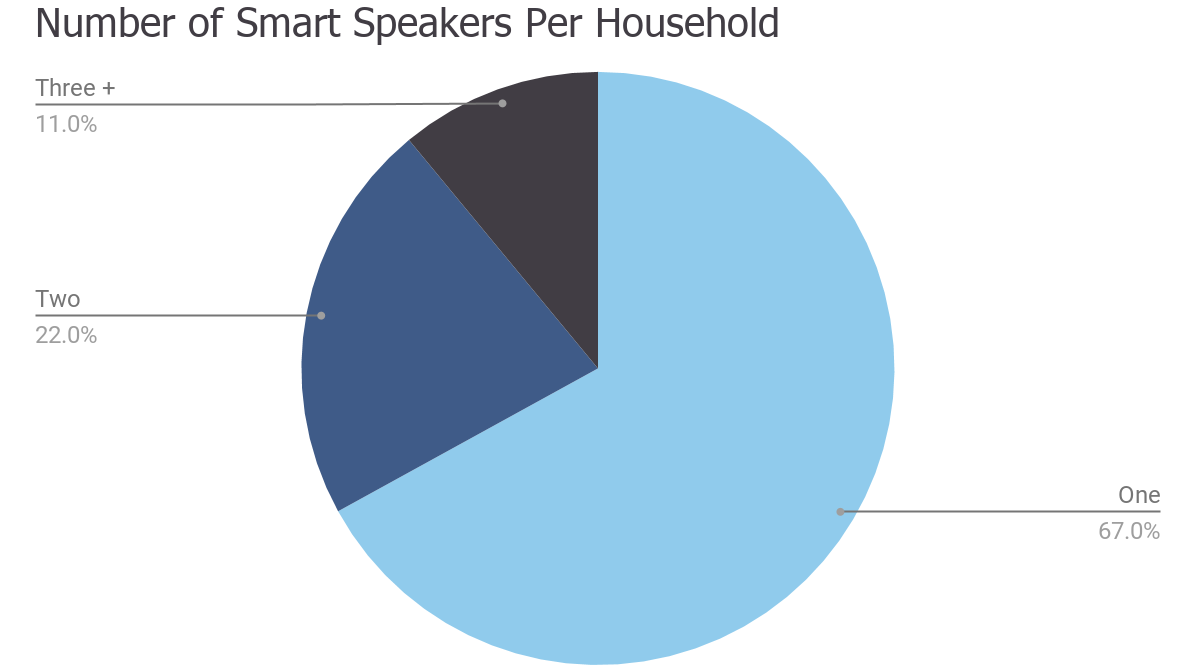
More smart speakers mean more rooms with easy access to podcasts, which reduces the friction involved in starting to listen to a podcast. It’s also arguably more habit-forming than having to toy with a touch screen and plug in earphones before you start listening - especially when cooking and eating.
This could dramatically increase podcast listenership!
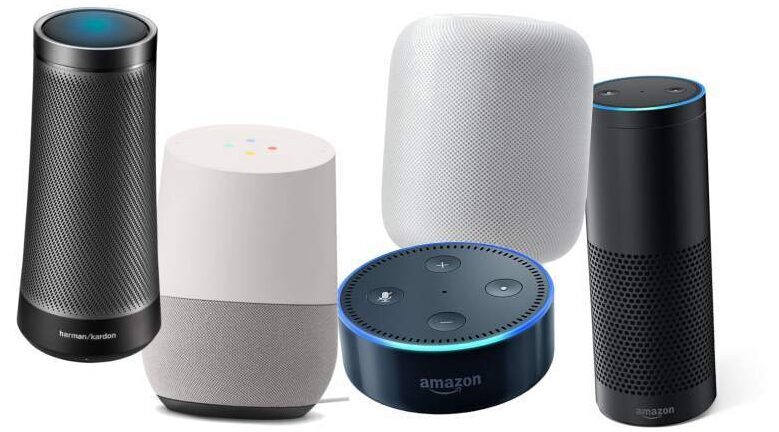
Smart speakers may create whole new categories of audio content. It’s possible that podcasts will be consumable not only in a linear ‘start to finish’ fashion but that content will be also be snipped and aggregated by algorithms to create unique audio experiences to allow listeners to ask to explore specific topics in more depth.
It seems highly likely that the rise of smart speakers will make consuming audio content part of everyday life for everyone with internet and podcasts are likely to play a large role in that.
Podcast Your Way to Success🌟
Reduce the time it takes to go from ZERO to HERO with our complete Podcast Blueprint. Industry-leading secrets and shortcuts means you can get started fast, with minimal fuss and no technical headaches. So what are you waiting for?

Thanks for subscribing!
We've just sent you an email, please follow the instructions to confirm your details.
My Prediction on the Future of Podcasting
Imagine it’s 2025 and you’re at home on the toilet, just sitting down on a prewarmed smart seat. In the mirror in front of you, there’s the reflection of an older version of you.

You listen to the rest of a podcast you were halfway through on your commute to work. You can’t remember the name of the episode but your smart speaker knows what you mean when you ask for it. You are trying to learn Portuguese, so you have the podcast converted into that language - the voices sound the same, only the language is different.
The podcast begins, and soon you find yourself engrossed.

Then, one of the presenters mentions a topic - let' say the 80/20 principle - that grabs your attention. He only mentions it fleetingly but you want to know more.
‘Cindy, aggregate content from my favourite podcasts on the 80/20 Principle’
Then, Cindy (your daughter changed the name of your smart speaker to the name of your dog as a practical joke and nobody ever changed it back) creates a podcast composed of sections from seven other podcasts and compiles them into more focused content. It does this using data in a very sophisticated way to identify the highest quality and most relevant content on that topic. It also always adds one less well-known podcast to give its creator exposure, just like Amazon does with new products on its search engine.
Within this new audio experience, another presenter puts forward an idea you want to explore further. You dive deeper into the web of podcasts and end up listening to a hyper-niche podcast about minimizing the time you spend cooking, presented by a housewife from Japan.

After four minutes, you’re done exploring that topic in detail and you command the speaker to go back to the original podcast and to follow you as you walk back downstairs to make dinner.
But first, there’s an advert...
“DO YOU LIKE MARS BARS? WELL, WE KNOW YOU DO BECAUSE AMAZON JUST SENT US YOUR TOILET ANALYSIS FILE. YOU SHOULD TRY NEW MARS CUBES…”
Data analysis has become extremely advanced and ads have become more targeted. This can be creepy, but it makes it really easy to find podcasts you love too.
You walk downstairs and find your friend spread across your sofa laughing so hard they’re crying, with a manic look in their eye. The comedy podcast they’re listening to was recommended to them by their toaster based on which jokes they laughed at in the past.
Well, that's my vision on the future of podcasting anyway. One thing I am confident of is that podcasts has a long way to grow yet and will become a larger part of our lives into the future.
Some things aren't going to change: people will always enjoy learning, laughing, and listening to stories. Unless our ears all simultaneously fall off then podcast will continue to grow in popularity.






